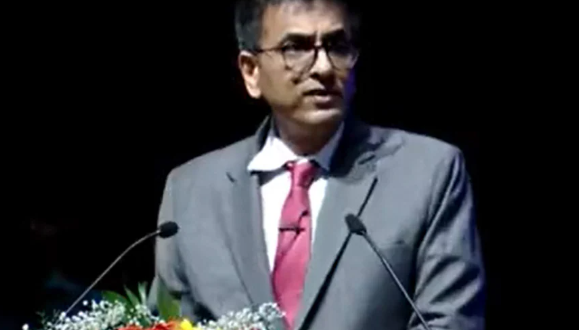DAINIK NATION BUREAU : In an address to law students on the challenges of the legal profession, Chief Justice of India DY Chandrachud has shared a personal anecdote that resonated with his audience. During his speech the Chief Justice chose to speak about his late first wife. He offered a unique insight that transcends textbooks and highlights the realities faced by legal professionals.
Addressing a gathering of law students, Chief Justice Chandrachud stepped beyond the formalities of his position to impart a lesson drawn from his own experiences. The mention of his late wife, who was also a lawyer, was not originally scripted as part of his speech. According to sources close to the Chief Justice, he made a spontaneous decision to incorporate this aspect of his life, believing it would offer more meaningful and relatable wisdom to the young minds in front of him.
“My late former wife, who was a lawyer, when she went to a law firm, she asked what would be the working hours, and she was told it is 24×7 and 365 days,” Chief Justice Chandrachud recounted. His account painted a stark picture of the demanding nature of the legal profession, where round-the-clock dedication is often a given.
The Chief Justice went on to share the reality his late wife confronted, a reality that many legal professionals, especially women, have faced. She inquired about the possibility of balancing her career with family commitments, only to be met with a harsh truth. “When she asked what about ones with family, she was told to find a husband who can do household chores and there is no family time,” Chief Justice Chandrachud revealed.
This heartfelt revelation underscored the gender biases and challenges that persist in the legal field and many other professions. It offered a glimpse into the struggles of female legal professionals who often navigate the delicate balance between their careers and familial responsibilities.
By weaving his personal experience into his address, Chief Justice Chandrachud provided a rare insight that resonated deeply with his audience. He acknowledged the need for change, advocating for an environment where professionals, regardless of gender, can pursue their careers without compromising their personal lives.
In many ways, the Chief Justice’s anecdote humanized the legal profession, reminding aspiring lawyers that their journey will not be defined solely by textbooks but also by real-world challenges. It conveyed a message of empathy and understanding, urging young minds to be prepared for the demands they may encounter in their pursuit of justice.
In conclusion, Chief Justice DY Chandrachud’s decision to share his personal experience in his address to law students offered a unique and relatable perspective on the challenges of the legal profession. His openness not only humanized the highest echelons of the judiciary but also highlighted the ongoing need for equality and work-life balance within the legal field. It’s a lesson that transcends the walls of academia and invites aspiring lawyers to confront the real-world intricacies of their chosen path.
 Dainik Nation News Portal
Dainik Nation News Portal


